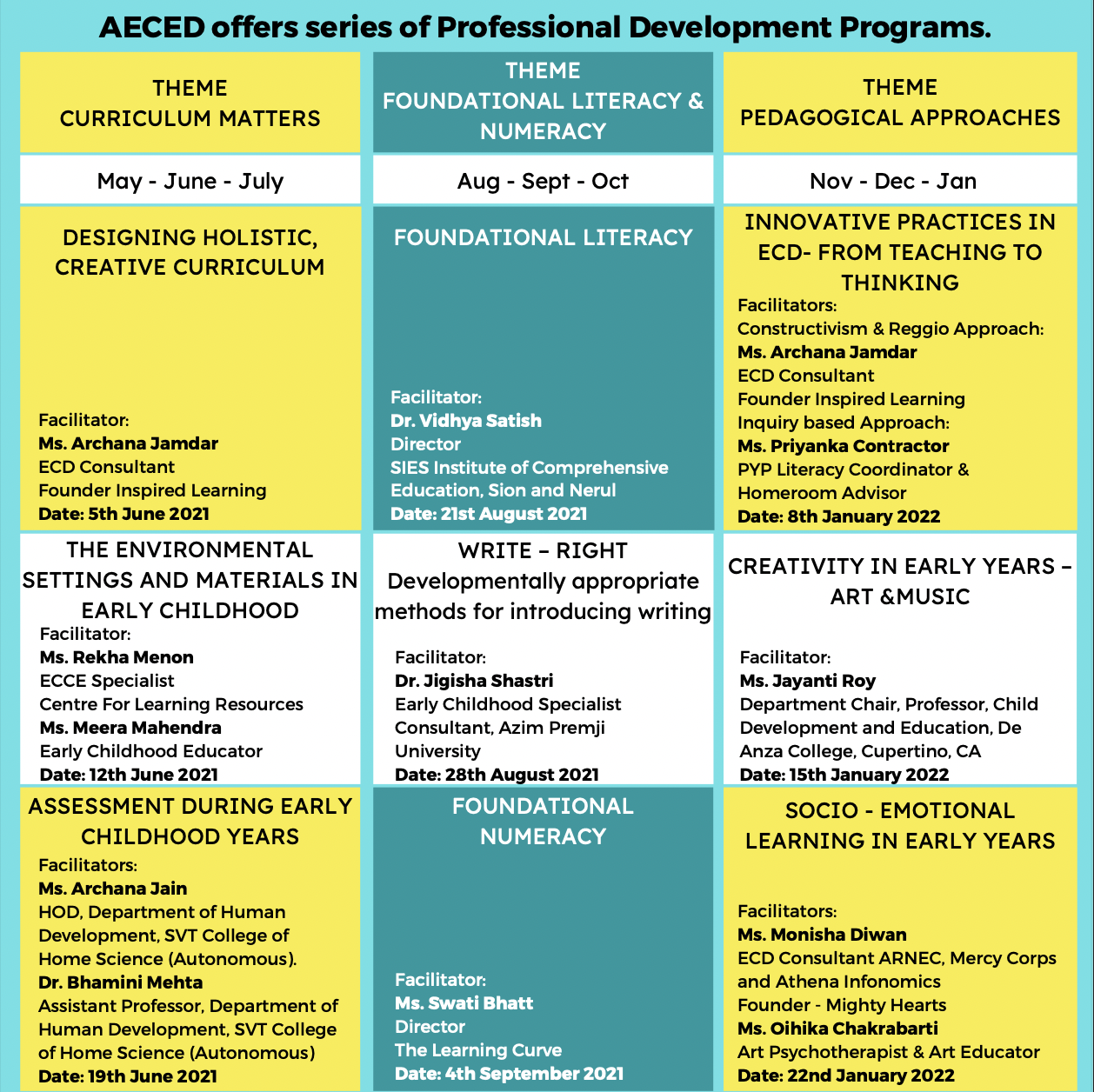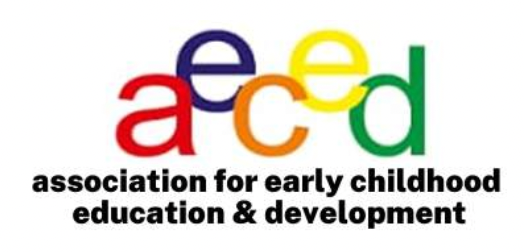Professional Development Program 2021-22

![]()
From survival to impact – Teacher development series
It’s a fast changing world and 2020 was a milestone year in terms of change.
Everything around us changed – our homes, work styles, lifestyles and our environment. Many lessons were learnt and we are still adapting and accommodating with changes on a daily basis in 2021.
The sudden and unprecedented shutting of schools due to the COVID- 19 pandemic forced educators to face the most rapid change of any profession in history. Within a moment’s notice, teachers were asked to leave their classrooms indefinitely and move to virtual learning.
Meanwhile 2020 became the landmark year for early childhood, with the coming out of the New Education Policy (NEP) 2020. NEP has emphasized the importance of foundational years and sees EARLY CHILDHOOD as a time to develop:
- Curiosity
- Critical thinking and problem solving
- Appreciation for arts, craft and nature
- Foundational literacy and numeracy
- Social and emotional connect with self and others
The challenge is to make learning equitable, interactive, accessible & life-long for our children and teachers.
Since teachers are the most important factors in student success, it ‘s important to develop teachers’ strengths and provide opportunities for their growth. This means building professional skills on an on-going basis.

Program Details
- Sessions duration – 90 minutes
- Timings – 4.30 pm
- The PDP series in January will be for two hours
Fees (per program)
- INR 400/per session for members
- INR 700/per session for non-members
Foundational Literacy
Saturday, 21st August 2021
Been in the field of preservice early childhood teacher education for the last two decades.
Program Outline
For school success and lifelong learning, it is important to develop the ability to read and write. Thus, achieving foundational literacy is a national mission as envisaged by the NEP 2020.
This program focusses on
Orienting educators in understanding the meaning and importance of foundational literacy, knowing the components of language skills with special emphasis on reading and writing, and designing and developing developmentally appropriate literacy related activities for the early years’ classroom.
Empowering educators with strategies that will enable children to read with comprehension, write with understanding and clarity and speak with coherence.
This program aims to provide an educator’s kit to achieve foundational literacy.
Program Objectives
- To enable participants to understand the need and importance of foundational literacy as the building block to other skills.
- To facilitate optimal development of foundational literacy through activity-based learning in the early years.
- To aid educators to develop resources and design implementation strategies that focus on foundational literacy.
Write – Right Developmentally appropriate methods for introducing writing
Saturday, 21st August 2021
Been in the field of preservice early childhood teacher education for the last two decades.
Program Outline
Has worked extensively both with Private preschools and Government ICDS programs and Balwadis, and with UNICEF in curriculum development, capacity building of teachers, teacher trainers, and program developers for Early Childhood Care and Education (ECCE). Selected by World Forum Foundation as a Global Leader from India, for the year 2009-2010. Was an Associate Professor with Human Development and Family Studies Department at Maharaja Sayajirao University of Baroda, and was superintendent of Chetan Balwadi: The Laboratory Nursery School.
Program Outline
The workshop will focus on emergent writing as an integrated component of emergent literacy. Participants will be helped to move through the pathway of children’s development of writing skills from general scribbling to meaningful writing. Experiences to promote writing both at home and school, as part of a developmentally appropriate ECE curriculum will be discussed.
Participation will be encouraged through discussion, brain storming, and active analysis to immerse themselves in the topic.
References and websites for further reading will be suggested.
Program Objectives
- Understand the importance of introducing writing to young children in a developmentally appropriate way.
- Orient the participants to the processes involved in beginning writing for young children.
- To place ‘writing’ within the context of NEP 2020.
Foundational Numeracy
Saturday, 04th September 2021
Program Outline
The program will aim to ignite thinking in practitioners to help them design EARLY MATH learning pathways for Foundational years. It will discuss ways to create an active learning environment that fosters curiosity, confidence, and persistence in children as they learn math. It will discuss the importance of three key ingredients to the successful acquisition of math in the early year’s namely mathematical relationships, number sense, and the ability to solve problems. The whole focus would be on making MATH is FUN while building concepts across grades.
The program will focus on 6 significant areas of early numeracy ( 1. Numbers and counting 2. Sharing, number comparison and ordering 3. Calculations 4. Patterns 5. Shapes and 6. Measurement) across the foundational years (Pre K.G. – Grade 2)
Program Objectives
Introduction to Foundational Numeracy.
WHY AS WELL AS HOW for teaching MATH to young children (Pre K.G. – GRADE 2).
To appreciate the value of play in teaching math concepts.
To learn to develop innovative pedagogical practices and classroom activities.
Interesting games and activities designed to build math skills in children. Use stories and books that introduce, build and reinforce math concepts. Everyday math for facilitating learning of math concepts for children.
To view and learn a few methods to check knowledge and skills in using math concept.



